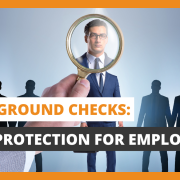25
How to Find Out Where Someone Works: A Complete Guide to Employment Verification
Finding out where someone works can be crucial for various reasons, such as debt collection, fraud investigation, or background checks. This guide explores how to verify employment effectively, with methods ranging from free social media searches to paid employment databases and private investigator services.
Learn the best ways to perform a place of employment search, and understand when it’s necessary to use reliable data sources.
Why You Might Need to Verify Employment
Understanding someone’s workplace is essential in fields such as legal matters, debt recovery, fraud detection, and background checks. Whether you are conducting skip tracing for debt collection or evaluating someone for a background check, knowing where a person works can be vital to your next steps.
Here are some common scenarios where verifying place of employment is beneficial:
- In legal situations like wage garnishment or fraud investigation, having verified employment data allows you to proceed confidently. Knowing a person’s job details is critical for timely action.
- For businesses working with non-paying clients, this knowledge can direct efforts like garnishment or levies more effectively.
- Verifying someone’s work history is also essential when assessing qualifications for financial products, such as loans or credit. Without up-to-date employment details, decisions can be made based on inaccurate assumptions.
This article will guide you through methods ranging from social media searches to professional tools like Searchbug’s Place of Employment (POE) Search. We’ll also cover legal considerations and challenges to help you navigate the process efficiently.
How to Find Out Where Someone Works: Free Methods vs Paid Solutions
1. Using Social Media to Find Employment
Social media platforms can be a quick and cost-effective way to gather employment information. However, these methods may not always be reliable for official purposes, such as wage garnishment or legal actions.
LinkedIn:
LinkedIn is one of the most reliable platforms for employment data, as users typically maintain up-to-date profiles with job titles, companies, and work history. This makes it a great tool for employment verification.
You can use LinkedIn’s search function to find a person’s current and past job roles. Many professionals include their work history and achievements, which adds credibility to the data.
Facebook & Instagram:
While these platforms can provide indirect clues about someone’s work, they aren’t as reliable for accurate, professional information.
Facebook might show a person’s workplace in their profile, but the data isn’t guaranteed to be current or accurate. Instagram offers fewer opportunities for employment checks but may provide context based on the individual’s posts or mentions of work-related events.
While these methods are free, they should be used cautiously when you need verified information. If accuracy is crucial, consider moving to paid services.
2. Using a Paid Employment Search
Paid databases like Searchbug offer a higher level of accuracy compared to social media searches. These tools provide access to verified data that is essential for skip tracing, legal actions, and background checks.
Searchbug’s POE Search:
Searchbug’s POE Search aggregates data from both public records and proprietary sources, ensuring that the information you find is current and reliable.
Unlike social media, paid searches are more likely to return verified employment records, which are vital for business, legal, or financial purposes. With Searchbug, you can access detailed work history that goes beyond social media, making it an indispensable tool for professionals.
Here are the key benefits of using a paid employment database:
- Accuracy: Paid services are more likely to provide accurate and up-to-date information. These databases use official public records and proprietary sources to ensure reliable results.
- Reliability: Paid sources offer comprehensive data from private and public records, ensuring the information is trustworthy—essential for legal and background check purposes.
Step-by-Step Guide to Using LinkedIn and Google for Employment Searches
Using LinkedIn for Employment Verification
LinkedIn is one of the best tools for free verification. Here’s how to do it:
- Search the person’s name: LinkedIn will show you the person’s current and past job roles. Look for their listed company, job titles, and any endorsements or connections related to their professional work.
- Check mutual connections: If you have shared connections, this can confirm the person’s workplace. LinkedIn’s connections feature allows you to verify the authenticity of the person’s work history through mutual acquaintances.
- Send a message: If necessary, contact the individual to clarify their job details or verify certain information. LinkedIn’s messaging system offers an easy way to reach out, but remember to be respectful when requesting confirmation.
LinkedIn is a great starting point for employment verification, especially for public-facing roles. However, for private or less transparent jobs, it might not provide complete details.
How to Search for Employment Using Google
Google can provide useful results when searching for a person’s job. Here’s how to maximize your search:
- Search for the person’s full name: Add terms like “current employer” or “workplace” to your search. This can help you find mentions of the person in news articles, job listings, or company websites.
- Look for official sources: Check for mentions in news articles, company websites, or employee directories to confirm employment. Company websites often list staff members, and local news articles may include the person’s role or company affiliation.
Google search is a great tool for exploring someone’s professional background and offers quick access to various mentions across the web. However, be aware that the information you find may not always be verified.
Using Government Databases for Employment Verification
Some states offer online access to employment records. Here’s how to use them:
- Check your state’s website: Many states provide online databases where you can search for public employee records. These resources can be helpful for government or public sector employment verification.
- Pay a minimal fee: Some states charge a small fee for accessing records, which you can submit along with the person’s details for verification. While this method isn’t always free, it is one of the most reliable ways to verify someone’s public sector employment.
Government databases are effective for public sector jobs, where employment records are usually more transparent. However, private-sector job details are harder to access through government channels.
Legal Considerations for Place of Employment Searches
When verifying someone’s place of work, there are key legal considerations to keep in mind. Understanding these aspects ensures you stay compliant with privacy laws and regulations.
Privacy Laws:
Privacy regulations, such as the Fair Credit Reporting Act (FCRA) and the General Data Protection Regulation (GDPR), govern how personal information can be used and shared. Be especially cautious when dealing with sensitive information like Social Security Numbers (SSNs). Depending on your jurisdiction, these laws may restrict how you can use the information obtained through your employment search.
Consent:
In some cases, especially with background checks, the subject’s consent may be required before conducting a workplace search. Be sure to obtain explicit consent if necessary. For example, if you are conducting a formal background check, you may need the subject to sign a consent form before you can legally access their employment history.
Jurisdictional Restrictions:
Some government databases may have access restrictions based on location or eligibility. Ensure that you are legally allowed to access the data before proceeding. Public databases are often region-specific, so verify if the state or county you’re searching in allows third-party access to employment records.
Always ensure the information you collect is used responsibly and in compliance with the law.
How Searchbug Compares to Competitors
When compared to other popular services like TruthFinder and Spokeo, Searchbug offers several advantages:
|
Feature |
Searchbug |
TruthFinder |
Spokeo |
|
Private Investigator Access |
Yes, licensed investigators with legal access to data |
No private investigator access |
No private investigator access |
|
Employment Data Accuracy |
Verified data from public records and proprietary sources |
Limited data, often from social media |
Relies on public records, but less verified |
|
Search Result Speed |
Fast and accurate results in real-time |
Can take longer for results |
Moderate speed and less accurate |
|
Legal Compliance |
Fully compliant with FCRA, GDPR, and privacy laws |
Complies with FCRA, but lacks transparency in data sources |
Complies with FCRA, but with limited data verification |
|
Data Sources |
Public records, proprietary databases, licensed investigator access |
Primarily social media, public records |
Primarily public records, some user-contributed data |
Searchbug’s place of employment search provides verified employment records that you can rely on, which is crucial when using the data for legal or business purposes. While services like TruthFinder and Spokeo may offer useful information, they lack the depth and compliance that Searchbug ensures with its licensed private investigators and robust data sources.
Tips for Avoiding Scams When Using People Search Tools
When selecting a people search tool, be mindful of scams. Here’s how to protect yourself:
- Check Reviews: Look at customer feedback to gauge the reliability of the service. Many trusted services will have positive reviews and customer testimonials that validate their accuracy and reliability.
- Verify Sources: Ensure that the service uses verified data sources. Reputable services like Searchbug use public records and proprietary data to deliver reliable results.
- Avoid Too-Good-to-Be-True Offers: If a tool promises instant results with little to no verification, proceed with caution. Legitimate services may take some time to generate results but will ensure the accuracy of the information.
Why Choose Searchbug for Employment Verification?
Searchbug’s Place of Employment (POE) Search stands out in the industry due to its unique offerings and commitment to compliance with privacy laws. Here’s why you should choose Searchbug:
- Access to Licensed Private Investigators: Searchbug offers the ability to verify employment through licensed professionals with legal access to more comprehensive data. This ensures you receive the most thorough and reliable employment information.
- Proven Track Record: We have helped countless businesses with employment verification, skip tracing, and background checks, delivering trusted and accurate results every time. Our success has made us a trusted choice for professionals across multiple industries.
FAQ: Common Questions About Verifying Employment
- Is it Legal to Find Someone’s Workplace?
Yes, but only for lawful purposes, such as debt collection or fraud investigations. Always ensure you are in compliance with privacy regulations when using sensitive information like Social Security Numbers (SSNs). - How Accurate Are People Search Tools?
People search tools like Searchbug provide reliable, verified data. For legal purposes, it’s crucial to choose tools that ensure compliance and provide up-to-date information. - How Long Does it Take to Verify Employment?
The time needed to verify employment depends on the method you use. Social media searches are immediate, but government databases and private investigators may take days to weeks, depending on the service.
Conclusion
Finding out where someone works doesn’t have to be a difficult or time-consuming process. Whether you opt for free social media searches, paid employment databases, or hire a private investigator, the right tools can help you verify employment quickly and accurately.
If you’re looking for guaranteed results, Searchbug’s POE Search offers a powerful solution with verified data, private investigator services, and easy-to-use tools designed for professionals.
Ready to streamline your employment verification process? Start your search today with Searchbug and get trusted, verified data in real-time.












